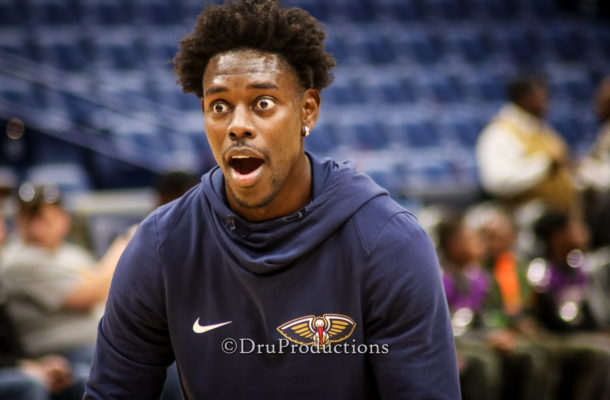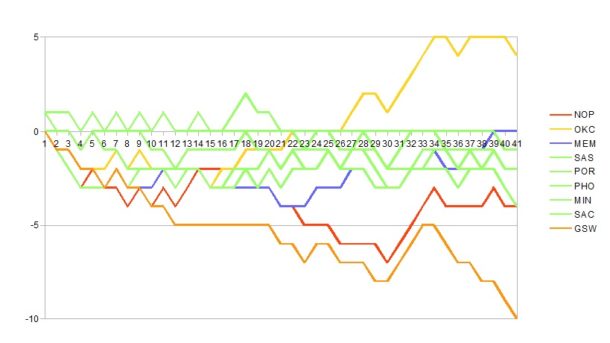« From Old Hoops to New Hopes
For Those Boarding the Zion Bandwagon »
It’s Time

The New Orleans Pelicans enter the last third of January at 16-27, 12th in the West, and just 0.5 game ahead of the tie at 13th and 14th. The next couple of weeks is not a normal couple of weeks, however. Rather, it is full of interacting uncharacteristically important events, each with the potential disproportionately affect the fate of the season, at least in relation to the Playoffs. The Pelicans can’t make the Playoffs with their performance here, but they can certainly put the much more out of reach.
- Zion’s Debut. The importance of Zion is well-established, but actually introducing him into the game plan as he acclimates to the game is a variable to keep an eye on. There is no doubt that the Pelicans should introduce Zion as soon as he is medically ready and with the blessing of the trainers. Trying to time his debut for some perfect moment is a fool’s errand. He’s expected to be a net-positive on the season, so get to that and deal with the short-term costs, whatever they may be.
- Key Games. The Pelicans have 3 games against 2 teams that are hovering at the Playoff boundary. The Grizzlies sit in 8th at 20-22, and the Spurs sit atop the teams from 9th to 14th 1.5 games behind at 18-23. Both have 4 games left to play against the Pelicans and 1 game left against each other. The Pelicans play the Grizzles on the 20th and the 31st, the Spurs on the 22nd. These games have disproportionate importance since the Pelicans overcoming the Thunder in 7th is unreasonable today. These games affect the Pelicans record, that of the teams at or near the final Playoff spot, and tie-breakers with them.
- Health. The Zion news comes with an air of “getting healthy,” but the injury report has been occupied by half the regular minutes-getters lately. The Pelicans need to focus on winning as much as possible in the remaining 39 games, not just these few, so that tension is something to watch.
These are all important in their own right, but in this case they are all interacting. Zion’s debut is an important lift, but it will likely come during one of these first two key games (he was listed as Doubtful on an injury report for the Memphis game), which means it could come with a heavier than expected initial cost, still being well-worth it. You don’t get pennywise with these games and end up being poundfoolish on the season, and similarly with the team’s overall health. These are the tough situations for the people with the big paychecks.
The Grizzlies and Spurs absolutely know about the importance of these games and will bring their A-game. They will not toy around, waiting to drop the hard defense until the fourth like we saw Saturday.
The series with Memphis concludes in March. The final two games against the Spurs are in the last eleven games of the season, including the final game. The series are essentially play-into-play-in games, but the last game of the season could be a play-in game. We’ve seen that before.
Schedule and Standings
The Pelicans have 39 games left to play, 8 of which are against the Spurs and Grizzlies. Those teams have 40 and 41 games left to play entering Monday, respectively. Here is a look at how important these games are, illustrated how many games outside the series the teams need to win to get to a total of 40 wins on the season. There’s nothing magic about 40, but it’s a good swag at the Playoff threshold. It’s easy to adjust for some other win total.
| Pelicans Win | Pelicans Need | Grizzlies Need |
| 0 | 24 of 35 | 16 of 36 |
| 1 | 23 of 35 | 17 of 36 |
| 2 | 22 of 35 | 18 of 36 |
| 3 | 21 of 35 | 19 of 36 |
| 4 | 20 of 35 | 20 of 36 |
This is not heavy-duty analysis. It’s just a straightforward look at how the key facts interact: the results of the series, the remaining game total, and the current standings. The Pelicans need at least split this series, clearly.
Here is a look at the Spurs series.
| Pelicans Win | Pelicans Need | Spurs Need |
| 0 | 24 of 35 | 18 of 37 |
| 1 | 23 of 35 | 19 of 37 |
| 2 | 22 of 35 | 20 of 37 |
| 3 | 21 of 35 | 21 of 37 |
| 4 | 20 of 35 | 22 of 37 |
The situation is not as dire, as the Spurs have won 2 fewer games, though they did play 1 fewer, too. The fact that the Pelicans have fewer opportunities to win than either of their opponents is a net-disadvantage. Playing from behind, they need the opportunities. Looking at the case where the Pelicans sweep the Spurs highlights this point. In the games outside the series, the Spurs need 2 more wins, but they also get 2 more shots to get them. Similarly, in the case where the Pelicans win the series 3-1, the Spurs have more opportunities to match the Pelicans’ win totals. Sure, the Pelicans will have the head-to-head tie-break, but if multiple teams are tied at 40, that may not matter. Still, the point is to illustrate the importance of these series given the standings.
Notes on Strength of Schedule
Apparent Strength of Schedule matters, and it should not be ignored. However, the following aspects of Strength of Schedule should be kept in mind:
- Timing. Strong teams playing late the season may be resting, allowing wins at a greater rate than earlier in the season.
- Injuries. A team may experience a key injury, weakening them later in the season compared to earlier in the season.
- Trades. The trade deadline will strengthen some teams and weaken others. The could reduce the importance of Strength of Schedule in addition to making a team deal with their schedule more effectively.
- Pairings. Two teams that play each other, no matter how good they are, walk around with 1 win and 1 loss. When the teams the Pelicans are trying to catch battle each other, the Pelicans are robbed of the best possible outcome. They are spared the worst, as well, but they need help. General strength of schedule does not factor this in. Since these teams are below 50% win rate, this aggravates the Pelicans’ woes.
Playing teams in the hunt is the worst case. Weak teams should be defeated at a high rate, not 100%, and teams whose position can not be meaningful changed will put up less of a fight. The Pelicans’ schedule could be a little harder than percentages show, and vice versa for other teams.
The Pelicans need to take care of business against the Grizzlies and Spurs, and finish the month 4-2, 9-6 overall. From 20-29 with 33 left to play and the worst cases off the table against the Grizzlies and Spurs, the Pelicans’ road to the Playoffs with Zion will be considerably smoother.
A Different Look at the Standings Flow
A slightly different look at the the way the Standings have evolved is something I find helpful, and I wanted to share it.
The typical look shows the win loss record at any give time, in some version of decending order. The gaps between teams are assessed to determine how well a team is doing and needs to do. You can look at this over time and see how teams rise and fall through the standings to see who is in, out, hot, not.
The following look differs in key ways. First, it looks at games played rather than time. Second, it is relative to 8th place, not a specific team. Third, because of this, it cuts off at the team with the fewest games played. Here, this is the Spurs, who just crossed the 41-game mark on Sunday with a win over the Heat.
These small difference makes clear some features that get buried in the typical look. You can still see that the Thunder and Warriors are away from this pack. I made the Pelicans and Grizzles have their own colors, but I left all the others, Spurs included, with the same color to drive home the point. that they are all basically “the same.” The Pelicans are of interest for a couple of reasons, including that’s the team we care about and that they are just now coming into contact with the peloton. The Grizzlies lead the pack, so I point them out.

Here are some observations:
- The peloton has been remarkably consistent once you ignore team identity. This reinforces two points. One is that you are not competing against just 1 team, but against the group. Particularly, the best today may not have been the best yesterday and may not be the best tomorrow. Not knowing you opponent is a disadvantage. The other point is that none of them have broken out. If you can get past them, the season’s history says they won’t catch up.
- There are remarkably few jumps made, either way. The Warriors, he Thunder, and the Pelicans show some consistent movement . . . all at the same time. Even the 13-game losing streak does not appear as a straight stop. This is because the team in 8th is losing too. If you assume baseline performance at 8th, you expect half your wins and half your losses to line up with those another team. So, a 13 game losing streak shows up as a drop of about half that, which is what we see. The runs mention before coincide with a losing streak by Portland.
- To make up something like 4 games, it will take about 15 games, given the win rates of these teams. The Pelicans could shorten this due to the head-to-head matchups, a win streak, or just plain luck.
- This ignores games 42+ from other teams. The Pelicans are 1-1, Grizzlies 1-0 since then. So, these graphics are still meaningful, and they suppress some of the illusory ties. For example, consider a team that is 40-42. They are done. A team that is 39-31 is tied with them in a half-games-back sense, but they can end their season with 39, 40, or 41 wins. Each team’s position has good and bad, but the teams are decidedly not tied since one has life and the other does not.
I’ll keep these up through the season.




